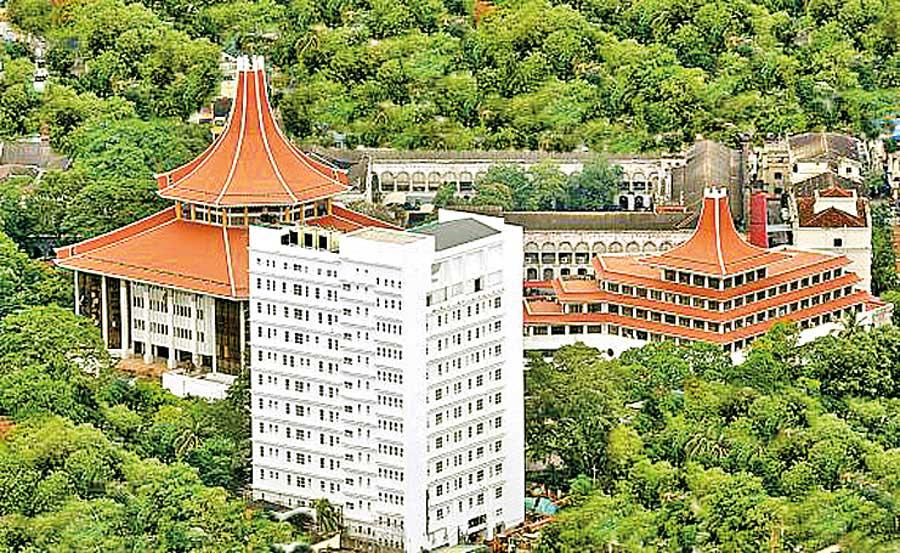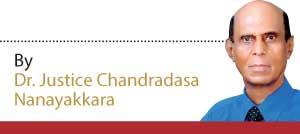03 Feb 2023 - {{hitsCtrl.values.hits}}

Court can always refuse an application by prosecuting officers to withdraw an indictment already filed in court
In our criminal justice system, the prosecution of trials is normally preceded by the investigation of criminal offences by the police. Investigation of crimes fall within the domain of the police, and for this specific purpose the police have been given a great deal of authority -to arrest, to search, to detain and to use force in certain circumstances in accordance with the criminal procedure code and other relevant laws.
police, and for this specific purpose the police have been given a great deal of authority -to arrest, to search, to detain and to use force in certain circumstances in accordance with the criminal procedure code and other relevant laws.
The functions of the Attorney General and his prosecutorial staff normally begin following the completion of investigation by the police and the indictment is filed in court. Admittedly, Attorney General as the Chief Legal Officer of the State with his prosecutorial staff performs a crucial role in our society.
For years, the Attorney General and his prosecutorial staff have faithfully been discharging their functions under successive Governments and Constitutions, retaining their nonpolitical status and the independence of the office. Attorney General and his staff have always acted independently in the public interest, ensuring effective criminal prosecutions and advising the government on many legal, legislative and executive matters. But in recent years, the complex varied nature of the Attorney General’s functions has given rise to a great deal of controversy and debate about his role. The public now perceive a gradual erosion of the independence of the office of the Attorney General. As a result, it is in a climate of distrust and discontent that the Attorney Generals department now operates.
The public now perceive a gradual erosion of the independence of the office of the Attorney General
As a result, the members of public and the legal profession have taken a more active interest in scrutinizing and examining the decisions of the Attorney General and his prosecutorial staff in such matters as filing of indictments, prosecutions and withdrawal of cases and the public has demanded greater transparency and accountability in this respect. People expect the office of the Attorney General to be protected and insulated from political and other extraneous influences and that prosecutions should be conducted in accordance with fairness and respect for the law.
In criminal cases, the Attorney General is responsible for representing not only the interests of the society at large, but also those of the victims of crimes. He also has duties to other individuals including persons accused of crimes and witnesses.
In the task of prosecution, the Attorney General and his prosecutorial staff are required to apply the law to criminal cases, protect the rights of the persons involved in criminal proceedings, respect human dignity and fundamental rights and ensure public security. The duty of the prosecutor is to seek justice but not at any price.
The Attorney General and his prosecutorial staff have recently withdrawn many criminal cases involving politicians and other influential people without assigning valid and cogent reasons. Repeated misuse of power by the Attorney General in withdrawing a spate of prosecutions without substantial grounds is a matter to be viewed with suspicion. Many of those cases relate to serious offences such as bribery and corruption and other criminal offences punishable with imprisonment. No doubt, under the Criminal Procedure Code withdrawal from prosecution is permissible in public interest assigning valid reasons and should not be done for extraneous consideration. Enforcement of the criminal law should not be a matter of expediency. Such application for withdrawal should be made in good faith, in the interest of public and not to thwart or stifle the process of law.
Supreme court
Before a prosecution is withdrawn there has to be application of a judicial mind by the prosecutor. If criminals and other wrong doers are left free to pursue their illegal activities the departmental morale and supervision is bound to drop and its image suffers. The relations between citizens and the Attorney Generals department depend to a great extent on the level of confidence people have that its officers will act honestly and impartially.
Therefore, it is incumbent upon the court to see that withdrawals are made to meet the ends of justice and not for an improper motive or extraneous considerations.
The Supreme Court has laid down the law in a series of cases, the importance of independence of the Attorney General and his prosecutorial staff. The prosecutor must apply an independent mind, as he acts as a limb of the judiciary and not the executive and withdrawal should be exercised not in a whimsical or arbitrary manner but should be done for valid, just and judicially tenable reasons.
It must be understood that any criminal offence is one against the society at large casting an onerous responsibility on the Attorney General and his prosecutors as the guardians and protectors of law to discharge their sacrosanct role responsibly and impartially.
Repeated misuse of power by the Attorney General in withdrawing a spate of prosecutions without substantial grounds is a matter to be viewed with suspicion
When an offence is committed, the criminal justice system mandates fair and proper investigation with an avowed object to bring out all material before a court of competent jurisdiction to enable it to find out the truth.
Unsolved crimes, unsuccessful prosecutions, unpunished offenders and wrongful acquittals brings our criminal justice system as well as the judiciary into disrepute. The image of the judiciary will be tarnished, if the truth is going to suffer as a result of external pressure and the guilty person gets away from the clutches of law.
For this purpose, the personal character and integrity of the Attorney General and his Prosecutorial staff would be the most important factor in the impartial administration of justice. Proper administration of criminal justice throughout our country depends on the personal integrity of the person occupying the office of Attorney General and his staff.
Today, demands for greater transparency and accountability have put pressure on all our public institutions to be more open. Therefore, there should be more openness in the operation of the prosecution system as well. Public has become less tolerant of the secrecy in public affairs, they no longer blindly trust and accept decisions made by the Attorney Generals department and its officers.
There should be greater judicial scrutiny and vigilance of the prosecutorial function and with constitutional and well embedded institutional safeguards which protect the prosecutorial functions from political interference.
As the Attorney General and his prosecutorial staff are constantly in the public spot, it would be difficult for the Attorney General and his staff in our system to take direction from the government in regard to a prosecution without the matter becoming known and leading to some crisis.
Nothing could bring greater disrepute to the administration of justice if the government were directing prosecutorial decisions for narrow partisan political purposes. Suspicion that politics played a significant part in the handling of criminal prosecution would undermine the entire judicial proceeding.
Therefore, any practice of allowing political pressure by the government being brought to bear upon law officers when engaged in reaching a decision in any particular case should be avoided at all costs.
Court can always refuse an application by prosecuting officers to withdraw an indictment already filed in court. The prosecutor will have to convince court that his application is based on substantial ground.
The decision to prosecute or not can have far reaching consequences for an individual. If someone is prosecuted but acquitted that person may have suffered great anxiety and agony, stress or even loss of employment. Conversely a decision not to prosecute can be very distressing and agonizing for victims and their families. The Criminal Procedure Code governs the way in which prosecutors make decisions. In fulfilling this role , the prosecutors must be fair, independent and objective. He must not let any personal views about the suspect , victim or any witness influence his decisions. It is admitted that a prosecution is not automatically launched in every case where there is some evidence to support the laying of criminal charges. Attorney General has broad powers to decide whether or not to launch a prosecution in particular case, considering all the surrounding circumstances. But members of the public will be quick to detect cases where the Attorney General’s Department does not prosecute in cases where, manifestly prosecutions ought to be launched.
Generally, the Supreme Court does not interfere in the Attorney General’s discretion on the basis that exercise of discretion is a matter that falls within the ambit of the Attorney General, unless for the gravest of causes. However, the Supreme Court in 1998, in the case of Victor Ivan vs Sarath N. Silva, Attorney General held that the Attorney General’s power to file or not file an indictment is a discretionary power that is neither absolute nor unfettered and where such power or discretion is exercised in violation of a fundamental right, it can be reviewed in proceedings under Article 126 of the Constitution.
An independent an impartial prosecutor is a prerequisite to the effective investigation and prosecution of criminal acts.
Due attention should be given to the prosecution of crimes and offences particularly corruption, abuse of power and other grave crimes committed by our elected representatives who should set an example to members of public who reposed confidence in them.
For this purpose, an effective prosecution service, with well trained and adequately empowered and equipped prosecutors committed to the rule of law values would be necessary.
08 Jan 2025 37 minute ago
08 Jan 2025 1 hours ago
08 Jan 2025 3 hours ago
08 Jan 2025 4 hours ago